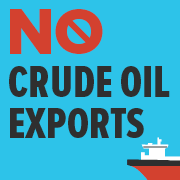
The End of the Export Ban?
The new year has started just like the old one ended, with the oil price continuing its downward slide. This morning oil dropped to five and a half year low as over supply continued to spook the markets.
 The new year has started just like the old one ended, with the oil price continuing its downward slide. This morning oil dropped to a five and a half year low as over supply continued to spook the markets.
The new year has started just like the old one ended, with the oil price continuing its downward slide. This morning oil dropped to a five and a half year low as over supply continued to spook the markets.
Such has been the fall in the crude oil price that the two international oil benchmarks – Brent and West Texas Intermediate – have now lost over half their value since the middle of 2014.
The declining oil price, coupled with intense lobbying by the oil industry, has meant that the Obama Administration has finally buckled and slightly relaxed the decades old crude export ban.
The ban was a response by Congress to the 1970s Arab oil embargo and it has been in place ever since. But for how much longer? Last week, the Department of Commerce agreed to the export of ultra-light oil, known as condensate.
Breaking months of silence and speculation, the Department undertook two decisive steps to allow crude oil exports. It firstly began approving requests to export processed condensate and secondly issued the first formal definitions of what constitutes exportable crude oil.
It is a worrying move, as it could be a slippery slope now for a full relaxation of the ban, which would be bad news for the climate and American consumers.
The Telegraph newspaper even went so far as to argue that “The move could signal that a full opening of the export ban, which has existed since the oil shock of the 1970s, is imminent.”
Oil Change International (OCI) and other groups, have long highlighted the risks of relaxing the ban. For example research by OCI, released in March last year, calculated that the lifting the ban could release 4.4 billion tons of CO2 into the atmosphere when burned, which is the “equivalent of annual emissions of 1,252 average U.S. coal power plants, or lifetime emissions from 42 coal plants.”
There is no doubt that, as the Financial Times reports this morning, that last week’s decision will push the export ban “up the political agenda” as “environmental concerns over shale production crosscut with rising tensions between US producers and Saudi Arabia over the falling price of oil.”
By all accounts it is a typical political fudge by the Obama Administration, trying to appease both the oil industry, by allowing the export of condensate, but at the same time not aggravating the environmental community by relaxing the whole ban.
But once again Obama can’t have it both ways: if action on climate change is going to be one of his major legacies, then the ban has to stay in place. He cannot allow the ban to be lifted because it would exacerbate climate change and spur on shale gas production.
Moreover it’s a New Year and time for bold decisions. So Obama has to stand firm now on the export ban as well as make a final decision on the Keystone XL pipeline. And that he cannot fudge. He has to reject KXL outright.
